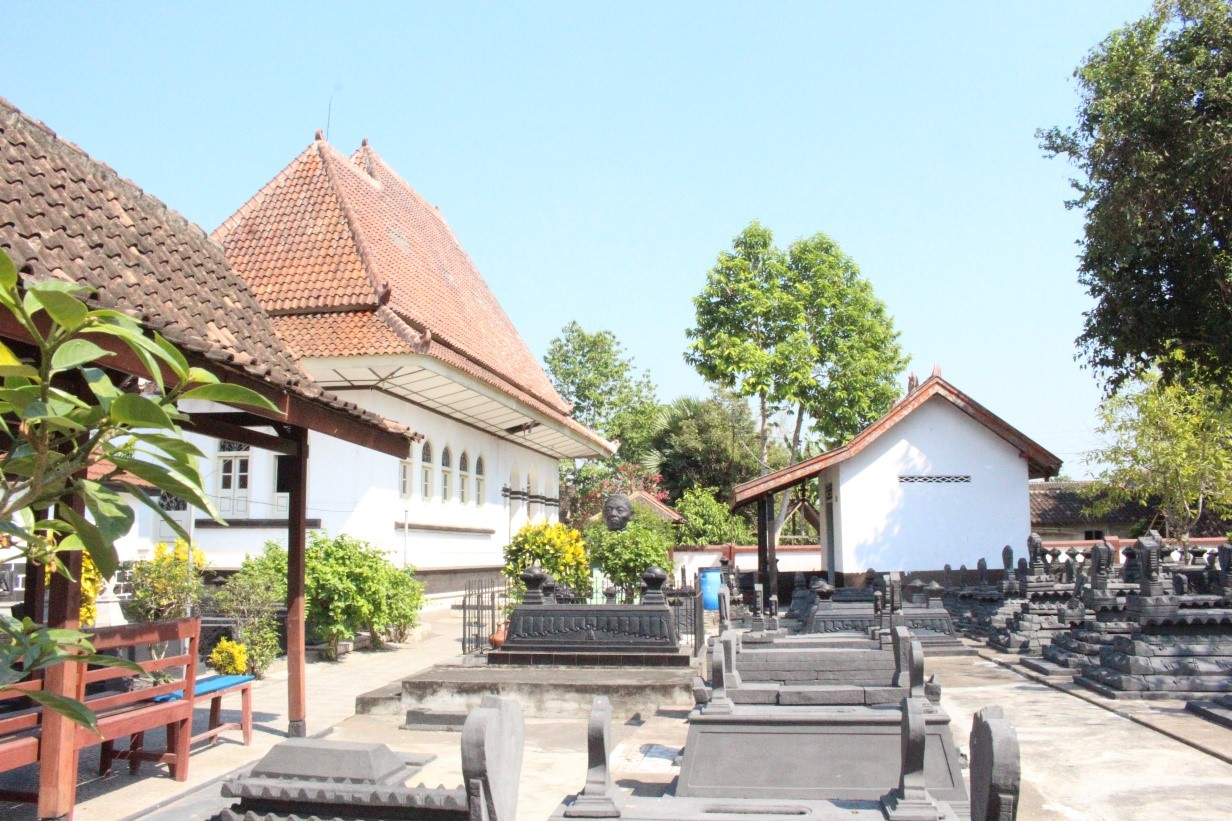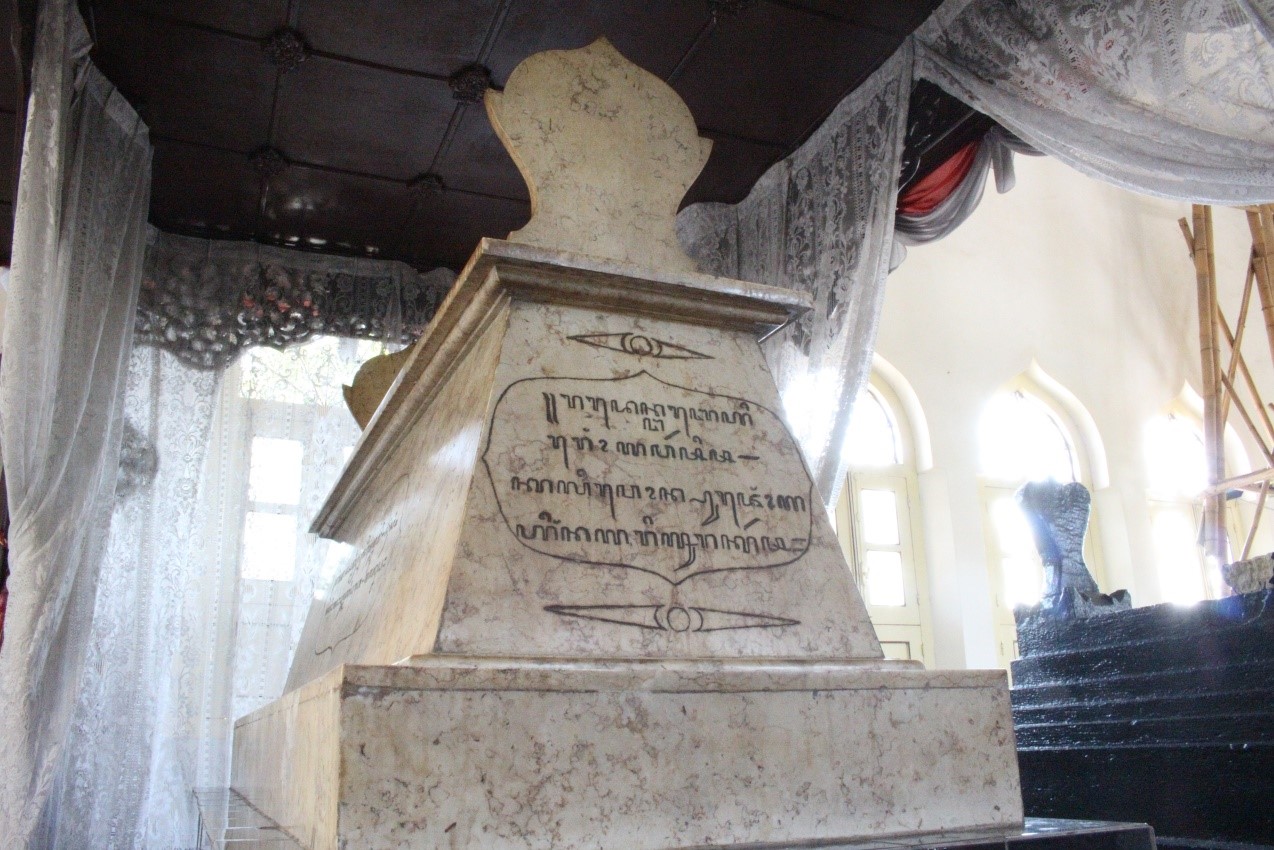As mentioned before, the childhood name of R. Ng. Ranggawarsita was Bagus Burham (Burhan). He was born on Monday Legi, 10 Dzulkaidah Be 1728 (1802 AD), wuku sungsang, Dewi Sri, Wurukung Uwas, Mangsa Jita, Windu Sangsara. He was the eldest son of M. Ng. Ranggawarsita, an abdi dalem Panewu Carik Kadipaten Anom through his marriage to Mas Ajeng Ranggawarsita, the daughter of M. Ng. Sudira Dirjagantang, a person who was known to have the ability to create macapat songs in the Palaran style (Ranggawarsita Committee, 1979: 11). According to the genealogy from his father's side, he was still a descendant of Pajang, namely Sultan Hadiwijaya (Jaka Tingkir) in Pajang, son of P. A. Arya Prabuwijaya (Prince Benawa), son of P. Emas (Panembahan Radin), son of Prince Harya Wiramenggala in Kajoran, son of Prince Adipati Wiramenggala in Congkal Sewu, son of Prince Harya Danupaya, son of K.R.T. Padmanegara, Regent of Pekalongan, son of R. Ng. Yasadipura I, poet of the Surakarta Palace, son of R. Ng. Ranggawarsita I or R. Ng. Yasadipura II or R.T. Sastranegara, son of M. Ng. Ranggawarsita II, son of Bagus Burham. Bagus Burham's grandfather, namely R. Ng. Yasadipura II was a fellow student of Kyai Imam Besari from Ponorogo. From the maternal line, Demak blood flows in his body, namely Sultan Trenggana (Sultan Demak II), son of R.T. Mangkurat, son of R.T. Sujana (Pangeran Karanggayan) courtier poet in Pajang, son of R.T. Wangsabaya Regent of Kartasura, son of K.A. Wangsatruna, son of K.A. Nayamenggala in Palar and held the rank of Demang, son of Ng. Suradirja I, son of R. Ng. Suradirja II (Suradirja Gantang), son of R. Ngt. Ranggawarsita II. She was the mother of Bagus Burham (Any, 1980: 11).

In his teens, he received an order from his grandfather to study, to learn the perfection of reading the Qur'an from Kyai Imam Besari at Pondok Tegalsari Ponorogo. As previously mentioned, Kyai Imam Besari was a fellow student of R.T. Sastranegara. In addition to being known as a role model cleric in Java, Kyai Imam Besari was the son-in-law of Sunan Paku Buwana IV. Therefore, it is not surprising that many children of penewu, mantri, even sons of lords and nobles studied with him (Komite Ranggawarsita, 1979: 13-14). Kyai Imam Besari is also known as Kyai Hasan Besari. He is a descendant of Kyai Agung Muhammad Besari, a cleric who pioneered the pesantren system in Java. The Tegalsari Pesantren which he built in the mid-18th century is said to be the first pesantren in Java. In addition to Bagus Burham, the Tegalsari Pesantren also produced many figures who founded pesantren. Some that can be mentioned, for example, are K.H. Abdul Mannan, the founder of the Termas Islamic Boarding School in Pacitan and K.H. Mujahid, the founder of the Sidoresman Islamic Boarding School in Surabaya (Masyhuri, 2008: 4-11). It is said that the Tegalsari Islamic Boarding School experienced its glory during the leadership of Kyai Hasan Besari (Masyhuri, 2008: 3).
Instead of being a diligent student, at the Tegalsari Islamic Boarding School, Bagus Burham was very lazy about studying the Koran. In fact, he preferred gambling and cockfighting. Cockfighting was his daily job. Due to his hobby, he was once expelled from the Tegalsari Islamic Boarding School by Kyai Hasan Besari, although he finally returned to the Islamic boarding school after Kyai Hasan Besari sent a messenger to pick him up. Finally, with the education and guidance of Kyai Hasan Besari, he became a person who was clever in the field of religion. After almost four years of studying at the Tegalsari Islamic Boarding School, he returned to Surakarta. By his father, he was immediately sent to Demak to study Arabic literature and Sufism with Prince Kadilangu (Any, 1979: 17). At the age of 18, as was customary for a nobleman's son, he began to devote himself to the palace. However, it seems that he was not satisfied with his work. He left the palace, wandering to various corners of Java. The wanderings shaped him into a critical and sensitive person in dealing with various problems. He expressed his feelings in Serat Kalatidha (pupuh Sinom) as follows.
Mangkja daladjating pradja
kawurjan wun sunja ruri
rurah pangrehing ukara
karana tanpa palupi
atilar silastuti
sardjana sudjana kelu
kalunglun kalatida
tidem tandaning dumadi
ardajeng rat dening karoban rubeda
Ratune ratu utama
Patihe patih linuwih
Pra najaka tyas raharja
Panekare betjik-betjik
Parandene tan dadi
Palijasing kalabendu
Malah sangkin andadra
Rubeda kang ngriribedi
Beda-beda ardane wong sanagara (Ranggawarsita, 1959: 11)
The meaning is more or less, the current state of the country has declined. The state of the state system has been damaged because there is nothing to follow anymore. Many have abandoned the rules, so that smart people are carried away by the current of the age of doubt. The tense atmosphere is also because this world is full of hassles. Actually, the king is a good king, his prime minister is also a smart person, even all his subordinates are kind-hearted, and the community leaders are also good. However, all of that does not create goodness, because of the Kala Bendu era (the age of torment). The hassles are getting worse, different people have different thoughts and intentions.
Under the rule of Paku Buwana IV, at the suggestion of Panembahan Buminata, he was appointed as Abdi Dalem Carik Kadipaten Anom with the title Rangga Pajang Anom on Monday Pahing 8 Sura Year Alip 1747 with the sengkalan Amuji Suci Pandhitaning Ratu (October 28, 1819 AD). After Paku Buwana IV died and was replaced by Pakubuwana V, he experienced difficulties, so his career was difficult to develop (Ranggawarsita Committee, 1979: 97). Paku Buwana V did not hold power for long. He was in power for only three years and died on 29 Besar Year Je 1750 (1822 AD). By his successor, Paku Buwana VI, Ranggawarsita was appointed Panewu Sadasa Kadipaten Anom in 1754 (1826 AD). Meanwhile, the situation and conditions of Java greatly influenced his career. He saw a lot of suffering from the common people because of the actions of the Dutch. General Deandels with his forced labor made a large road from Merak to Panarukan, causing a major disaster for the people. Daendels was replaced by General Jansens on 16 May 1811. In the same year, he was replaced and Java was finally controlled by the British under the leadership of Lieutenant General Thomas Stanford Rafles.
When the Dutch returned to power in 1816 AD under Governor General Van Der Cappelen, the people's lives became increasingly suffocated. At that time, the Java War occurred, led by Prince Diponegoro in 1825-1830. Together with Paku Buwana VI, Bagus Burham also seemed to sympathize with Prince Diponegoro's struggle. He helped find funds to be given to the starving people. When the Dutch found out that Paku Buwana VI was involved in Prince Diponegoro's struggle, the Dutch made arrests (Any, 1980: 39-42). Bagus Burham's father, M. Ng. Ranggawarsita was also arrested and taken to Batavia. He was thought to know about Paku Buwana VI's relationship with Prince Diponegoro. After being interrogated and tortured, he did not provide any information. Finally, Paku Buwana VI was arrested and exiled to Ambon (Tiknopranoto, n.d.: 10).
The next successor to the throne was Paku Buwana VII. He was appointed as the new King of Surakarta in the Year Jinawal 1757 (1830 AD). Under the new rule, Bagus Burham was appointed as Panewu Carik Kadipaten Anom as a replacement for his father who was also exiled to Batavia. At this time, he was known to have started using the title R. Ng. Ranggawarsita III and his career began to rise. At this time he also began to develop works through several writings, including: Wedyapradana (knowledge of astronomy), Jayabaya (predictions of events on the island of Java), Hidayat Jati (philosophy of the nature of humans towards God), Patilasan Kino ing Kediri (history), Paramasastra (knowledge of literature), Purwakaning Serat Pawukon (primbon), and Babon Serat Pustakaraja (history of kings) (Radyapustaka, "Ranggawarsita Book Exhibition", Surakarta, November 11, 1953).
At the suggestion of Panembahan Buminoto, he was appointed as Kliwon Kadipaten Anom and was appointed as the closing poet of the Surakarta Palace, replacing his great-grandmother Yasadipura I. He was appointed as a poet on 12 Ruwah Jimawal 1773 (September 14, 1845) which was marked by the sengkalan Katon Pandito Sabdaning Ratu. Since then, he has been known as a poet and literary expert, so that many native and Dutch nobles studied with him, including B.R.M. Harya Gondokusumo (K.G.P.A.A. Mangkunegara IV), BKT, Panji Dipokusumo, B.R.M. Panji Ismubrata, C.F. Winter, Fortier, Janson, and Dowing (Any, 1980: 50).
R. Ng. Ranggawarsita was also active in writing in magazines. Through his acquaintance with Fortier, he co-founded the Javanese magazine, Bramartani. However, because he was considered to have undermined the power of the king (Paku Buwana IX at that time), his life was in a state of chaos. His relationship with the authorities also became more distant, because he was accused of following the old pattern carried out by previous kings. Although conflicts often arose, it did not shift his position as a palace poet. He always tried to approach, although often unsuccessful. His efforts to approach Pakubuwana IX can be seen in the Serat Cemboret as follows.
Pangapusing pustaka sajekti
Saking karsa dalem sri narendra
Kang sanga mandireng
Surakarta prajagung
Sumbangengrat dibja dimurti
Martatama susanta
Santosa mbek sadu
Sadargeng galih legawa
Sihing wadja geng akit samja memuji
Raharjaning praja nata
The meaning is more or less, the creation of this literary work, is at the will of the king (Pakubuwana IX) who reigns in the great country of Surakarta. A great king, prominent and good in the world, kind-hearted and peaceful in his character and generous, so that the love of both the common people and other nobles, may pray for the safety of the country and the king. Because his efforts to approach Pakubuwana IX were unsuccessful, he wrote another work entitled Zaman Edan, as a criticism of the state of the Surakarta government as follows.
Amenangi jaman edan
Ewuh aja ing pambudi
Melu edan nora tahan
Jen tan melu anglakoni
Bo ja kadumen melik
Kaliren wekasanipun
Ndilalah karsa Allah
Begja-begjane kang lali
Luwih begja kang eling lawan waspada (Ranggawarsita, 1959: 12)
The meaning is more or less, living in this crazy era is indeed troublesome, you will follow without having the heart, but if you do not follow the movement of the era you will not get anything, which will eventually suffer from hunger. However, it is God's will, in any case people who forget are happy, even happier for those who always remember and are alert.
He died on December 24, 1873 at the age of 71 years. His grave is located in Palar Village, Trutuk, Klaten. Before he died, he also had time to write his last literary work as advice to his son. This work was realized in the Serat Pamoring Kawula Gusti. Some of the verses from the work are as follows.
Tuna dangkep kaulaning kapi
Pan kapiran jamaning akhirat
Sakarate yekti suwe
Suwe nuruti perlu
Perlu mati ngijeman delik
Kelike nora nana
Anane mung kuwur
Bawur tan wruh ing marga
Marga beda bedane tanpa pinikir
Mungkir ninggal agama
The meaning is more or less, people whose lives only serve their lusts and deny and ignore religious guidance, do not seek a good time of death, then in their lives they will experience error and will eventually suffer loss. Such people are the ones who will suffer, so that the time of the death throes becomes interrupted.

The tomb dome was first restored by Paheman Radya Pustaka Surakarta. This restoration was marked by a sengkalan on the eastern entrance gate that reads sembahing rasa hangesti tunggal. The second restoration was carried out in 1952, during this restoration the tomb was raised and the dome building was expanded to its current condition. After the restoration was completed, it was inaugurated by the Minister of Education and Culture at that time, Prof. Suwandi.
